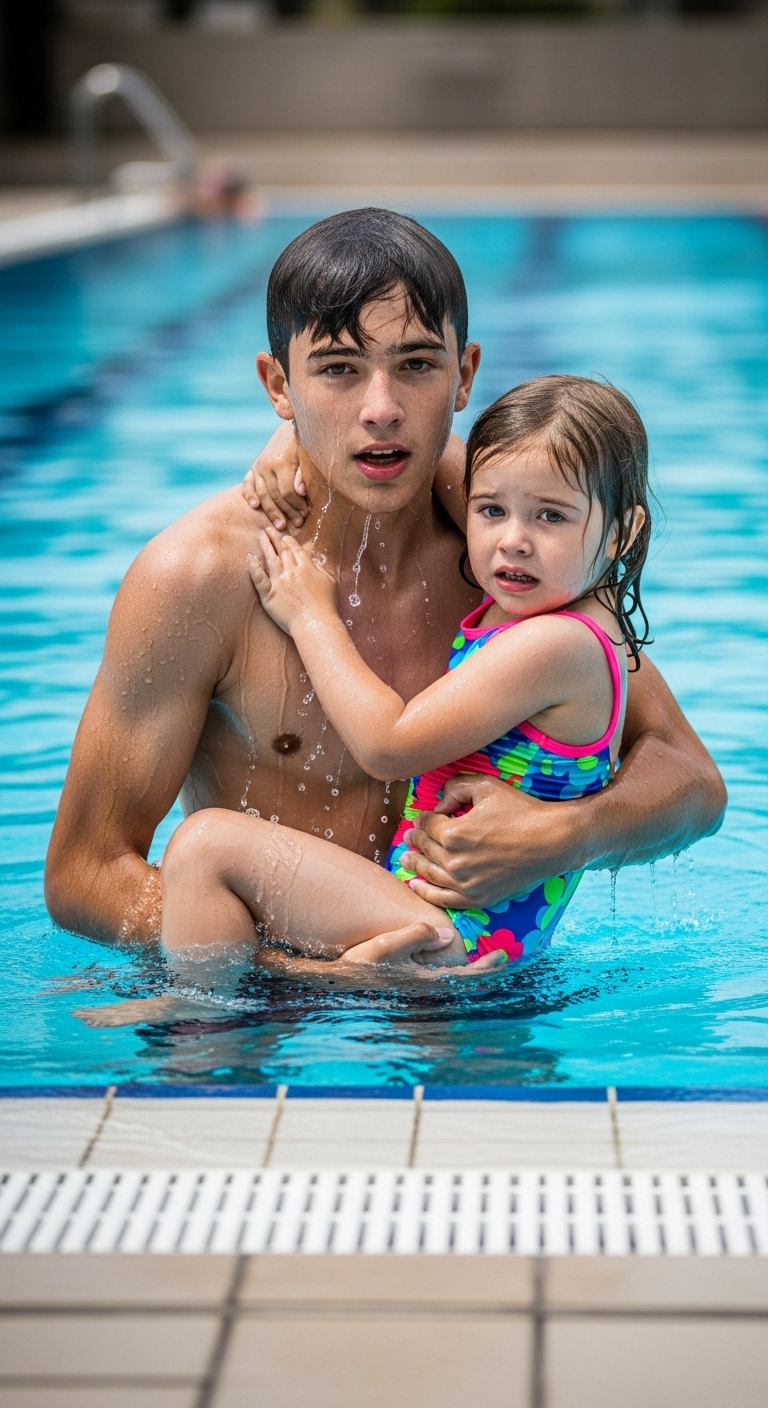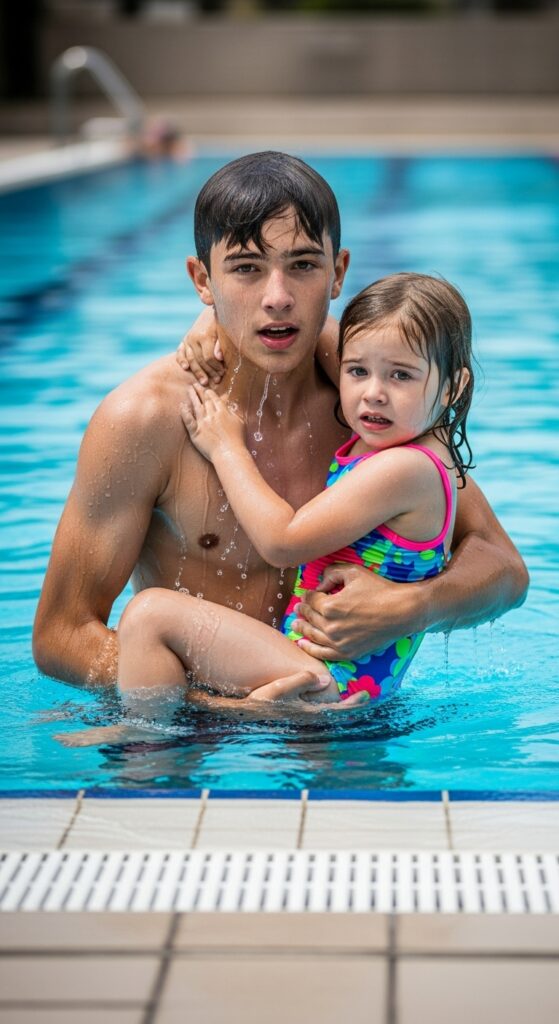My name is Laura Bennett, and I live in the quiet town of Maple Creek, tucked away somewhere in southern Wisconsin. It’s one of those places where nothing dramatic ever happens — kids ride their bikes down Main Street, the bakery still sells pastries for a dollar, and everyone knows who baked what for the church potluck.
I have two children: Ryan, my 15-year-old son, and Mia, my bubbly seven-year-old daughter. Ryan is thoughtful, often quiet, and has this instinctive sense of responsibility that sometimes makes him seem older than his years. Mia, on the other hand, is pure energy — full of laughter, curiosity, and endless questions.
Our lives were steady, calm, and blissfully uneventful — until that one hot July afternoon at the community pool.
The Day My Son Became a Hero
The air shimmered with heat that day, the smell of sunscreen and chlorine thick in the air. Kids splashed, lifeguards blew their whistles, and parents lounged under umbrellas with cold drinks.
Ryan was hanging out with a few friends near the diving board. Mia was in the shallow end, her pink floaties bobbing up and down as she giggled. I was sitting nearby, half reading, half daydreaming.
Then, all at once, a scream shattered the calm.
I looked up just in time to see Ryan sprint to the edge of the pool. Without hesitation, he dove in — strong, sure, fast. The water rippled violently, then went still. A small figure surfaced — a tiny girl, maybe four years old — limp and silent in his arms.
My heart froze.
Ryan carried her to the side, shouting for help. A lifeguard rushed over, checking her pulse, then performing light CPR. After a terrifying few seconds, the little girl coughed — then cried. That sound, that small, fragile cry, was the most beautiful sound I had ever heard.
Her mother came running, sobbing uncontrollably. “You saved her,” she whispered over and over, clutching her daughter close. “You saved my baby.”
Ryan just stood there, dripping wet, eyes wide, saying softly, “I just saw her and moved.”
Overnight, Everything Changed
By the next morning, the story had spread across town — and beyond. Someone had recorded part of the rescue, and within hours, the video went viral on social media. The local paper ran the headline:
“Teen Saves Toddler from Drowning at Maple Creek Pool.”
Our doorbell didn’t stop ringing for days. Neighbors came by with cards and cookies, teachers called to say how proud they were, and the mayor even sent a handwritten note thanking Ryan for his bravery.
Ryan took it all with quiet grace. When people asked how he did it, he simply said, “I didn’t think — I just acted.”
And I thought that was the end of the story. I couldn’t have been more wrong.

The Letter That Changed Everything
The morning after the media frenzy, I opened our front door and froze.
A cream-colored envelope sat on the welcome mat. There was no return address, no stamp — just our name, written in elegant script: Bennett Family.
Inside was a short letter:
“Please bring your son, Ryan, to the old Harrington estate on Willow Creek Road tomorrow at 4 p.m. There’s something I’d like to say — and something he deserves to hear.
— A. Harrington”
My curiosity was instantly piqued. The Harrington mansion was something of a local legend — an old estate on the outskirts of town, once grand but long abandoned after the patriarch passed away. People said no one had lived there for years.
Still, something about the note felt sincere. After some hesitation, I decided we’d go. Ryan was reluctant, but his curiosity won out too.
The Encounter at the Mansion
The next afternoon, we drove up the long gravel road leading to the Harrington estate. The mansion loomed before us — elegant but worn, its stone walls kissed by ivy and time.
An older man greeted us at the door. Tall, silver-haired, and dressed neatly in a cream vest, he looked like he belonged to another era.
“You must be Mrs. Bennett,” he said warmly. “And this must be the young man everyone’s been talking about.”
He introduced himself as Arthur Harrington and invited us inside.
The interior was stunning — sunlight pouring through tall windows, the scent of old books and cedar in the air. On the walls hung portraits of generations past, each face echoing a legacy of wealth and quiet sadness.
Arthur led us to a sitting room. Then, his voice trembled slightly as he began, “Ryan… the little girl you saved — her name is Ella. She’s my granddaughter.”
I felt my breath catch.
He continued softly, “My daughter, Caroline, and I have been distant for years. Misunderstandings… pride… the usual story. I hadn’t seen them for months before that day. When I learned that you, a boy I’ve never met, risked your life to save her — something inside me shifted. You reminded me of what truly matters.”
More Than Gratitude
Arthur stepped away briefly and returned with a folder and a small velvet box.
“I’ve spent years funding programs for young people who show integrity and courage,” he said. “I’d like to offer you a place in one of them — mentorship, scholarships, career guidance. Not as a reward, but as a thank-you. You’ve given me my granddaughter, and more importantly, you gave me back my family.”
Ryan blinked, visibly overwhelmed. “Sir, I don’t need anything. I just did what anyone would’ve done.”
Arthur smiled gently. “That’s exactly why I want to help you — because you did it without expecting anything.”
At that moment, a woman appeared at the doorway. She looked exhausted but beautiful, with tear-streaked cheeks and trembling hands. It was Caroline.
She walked straight to Ryan and whispered, “You didn’t just save my daughter — you saved me from losing myself.”
Then she turned to her father. “Dad… I’m sorry. For all of it.”
Arthur’s eyes glistened. “So am I, sweetheart.”
There, in that quiet room filled with sunlight and second chances, a broken family began to heal.
Reflections on the Way Home
On the drive back, the car was silent. Ryan stared out the window, deep in thought. Finally, he said, “Mom… I didn’t just help Ella, did I?”
I smiled softly. “No, honey. You helped them all. Maybe even yourself.”
He nodded. “Feels weird… but good.”
That night, Mia insisted we bake cookies — her favorite way to celebrate anything. As the kitchen filled with the smell of butter and chocolate, I looked at my children — one tall, growing into a young man, the other still small and innocent — and felt tears sting my eyes.
I whispered, “You two are the best parts of me.”
Ryan grinned and said, “You’re getting sappy again, Mom.”
Maybe I was. But that night, I understood something profound — kindness isn’t just about the act itself. It’s about the ripples it leaves behind.
A Lesson That Lingers
In the days that followed, news outlets picked up the story. People from all over sent messages, sharing how Ryan’s bravery had inspired them to act kinder, to notice others more, to appreciate life.
But to Ryan, none of that mattered. He still woke up early to help mow the neighbor’s lawn, still teased his sister, still rolled his eyes when I told him to clean his room.
He never wanted to be a hero.
But in his quiet, instinctive act of compassion, he reminded the world — and me — that true heroism doesn’t wear capes or chase recognition.
It just moves, when movement is needed.
When my 15-year-old son saved a little girl’s life, he didn’t just rescue a child from the water. He mended a family, inspired a community, and reminded his mother of the extraordinary power of simple, human goodness.
And sometimes, that’s all the world really needs — one pure act of courage to remind us that kindness still exists.
Final Reflection
Now, every time I drive past that pool, I still see it — the glimmer of sunlight on the water, the sound of laughter echoing, and the moment my boy became a man.
It wasn’t fame or fortune that changed him. It was compassion.
And as I watch him grow, I realize that the legacy of that day isn’t in headlines or viral videos.
It’s in every quiet moment that reminds us how love, courage, and second chances can change everything.


